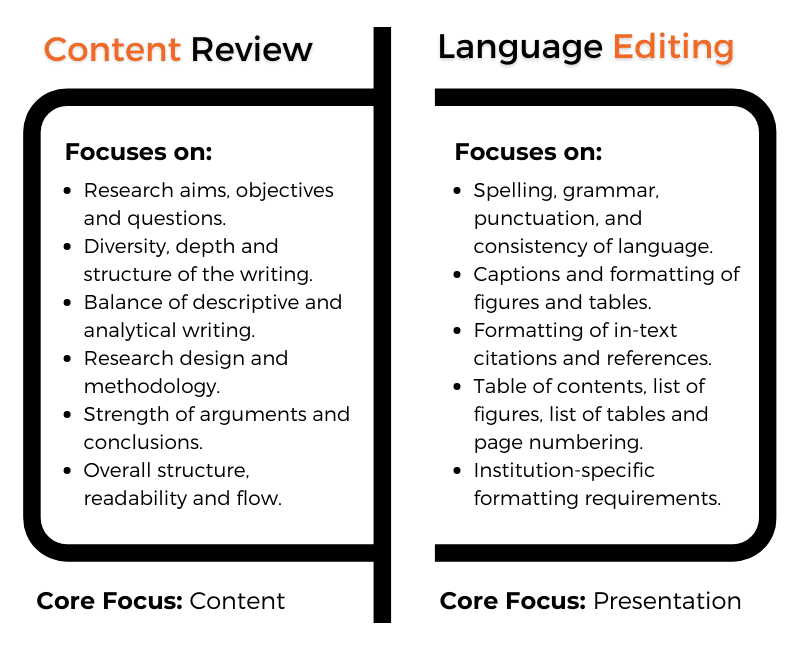What’s The Difference?

The 1-Minute Answer
Each service has a different focus and serves a different purpose:
The content review service focuses on the overall research quality, core arguments, methodology and structure. In other words, it focuses on the content.
The language editing and proofreading service focuses on the correct use of English language (spelling, grammar, punctuation, etc.) and formatting of citations and references. In other words, it focuses on presentation.
Both of these aspects are important, so these two services go hand in hand. However, they do take place at different stages – content review takes place throughout the writing process, whereas editing and proofreading takes place at the end of the writing process.

Which service should I use?
It depends on what stage you’re at and what you need help with.
If you’re still in the early stages of writing up and want to make sure your core content is on point, your design is justified and your structure is appropriate, the content review service is the best option.
Conversely, if you’ve completed your writing and just want a final polish to ensure the presentation, formatting and referencing are aligned with your university’s requirements, the language editing service would be more suitable.
Keep in mind that you should never submit your work without first thoroughly editing and proofreading your document (whether you do it yourself or have someone else handle it). There’s no quicker way to annoy a marker than to have typos and referencing errors in your document.
Where can I get more info?
You can get detailed information about each service on the following pages:
I’m still not sure…
If you’re unsure or have more questions about either service, feel free to get in touch.
Don't Stop Now - There's More ✨

How to Write Your Dissertation Without the All-Nighters
MIT and project management experts reveal the counterintuitive strategies that transform dissertation writing from chaos to productive, focused progress.

How to Stay Motivated Through Your Research
Struggling with research motivation? Experienced scholars share strategies for building resilience, embracing setbacks, and completing your dissertation.

Finding a Research Topic: What Your Professors Want You to Know
University faculty share their best advice for selecting a research topic. Discover the four essential questions to ask and how to reality-check your ideas.

10 Things Every Examiner Wants to See in Your PhD Dissertation
Skip the fluff. Here are the 10 boxes your PhD dissertation needs to tick to make examiners happy – and secure your pass.

Qualitative Research Basics: The 20,000-Foot View
New to qualitative? Learn about the four key phases of the qualitative research process: data collection, coding, analysis, and writing.

0 Comments